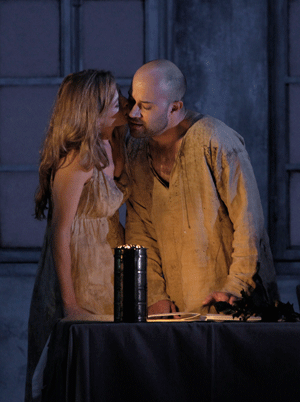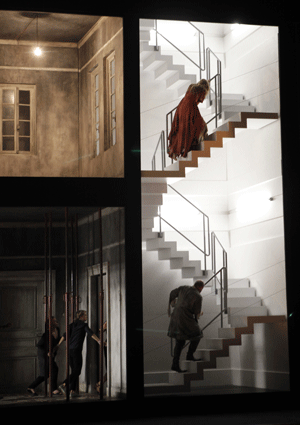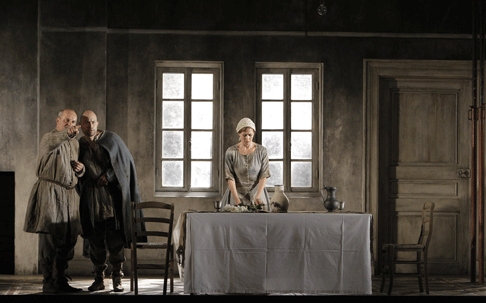
09 Jul 2012
Written on Skin at the Aix Festival
Not about tattoo art, not an evocation of the Holocast, and let us not even try to put our finger on what it is about.
English Touring Opera are delighted to announce a season of lyric monodramas to tour nationally from October to December. The season features music for solo singer and piano by Argento, Britten, Tippett and Shostakovich with a bold and inventive approach to making opera during social distancing.
This tenth of ten Live from London concerts was in fact a recorded live performance from California. It was no less enjoyable for that, and it was also uplifting to learn that this wasn’t in fact the ‘last’ LfL event that we will be able to enjoy, courtesy of VOCES8 and their fellow vocal ensembles (more below …).
Ever since Wigmore Hall announced their superb series of autumn concerts, all streamed live and available free of charge, I’d been looking forward to this song recital by Ian Bostridge and Imogen Cooper.
Although Stile Antico’s programme article for their Live from London recital introduced their selection from the many treasures of the English Renaissance in the context of the theological debates and upheavals of the Tudor and Elizabethan years, their performance was more evocative of private chamber music than of public liturgy.
Evidently, face masks don’t stifle appreciative “Bravo!”s. And, reducing audience numbers doesn’t lower the volume of such acclamations. For, the audience at Wigmore Hall gave soprano Elizabeth Llewellyn and pianist Simon Lepper a greatly deserved warm reception and hearty response following this lunchtime recital of late-Romantic song.
For this week’s Live from London vocal recital we moved from the home of VOCES8, St Anne and St Agnes in the City of London, to Kings Place, where The Sixteen - who have been associate artists at the venue for some time - presented a programme of music and words bound together by the theme of ‘reflection’.
'Such is your divine Disposation that both you excellently understand, and royally entertaine the Exercise of Musicke.’
‘And there was war in heaven: Michael and his angels fought against the dragon; and the dragon fought and his angels, And prevailed not; neither was their place found any more in heaven … that old serpent … Satan, which deceiveth the whole world: he was cast out into the earth, and his angels were cast out with him.’
There was never any doubt that the fifth of the twelve Met Stars Live in Concert broadcasts was going to be a palpably intense and vivid event, as well as a musically stunning and theatrically enervating experience.
‘Love’ was the theme for this Live from London performance by Apollo5. Given the complexity and diversity of that human emotion, and Apollo5’s reputation for versatility and diverse repertoire, ranging from Renaissance choral music to jazz, from contemporary classical works to popular song, it was no surprise that their programme spanned 500 years and several musical styles.
The Academy of St Martin in the Fields have titled their autumn series of eight concerts - which are taking place at 5pm and 7.30pm on two Saturdays each month at their home venue in Trafalgar Square, and being filmed for streaming the following Thursday - ‘re:connect’.
The London Symphony Orchestra opened their Autumn 2020 season with a homage to Oliver Knussen, who died at the age of 66 in July 2018. The programme traced a national musical lineage through the twentieth century, from Britten to Knussen, on to Mark-Anthony Turnage, and entwining the LSO and Rattle too.
With the Live from London digital vocal festival entering the second half of the series, the festival’s host, VOCES8, returned to their home at St Annes and St Agnes in the City of London to present a sequence of ‘Choral Dances’ - vocal music inspired by dance, embracing diverse genres from the Renaissance madrigal to swing jazz.
Just a few unison string wriggles from the opening of Mozart’s overture to Le nozze di Figaro are enough to make any opera-lover perch on the edge of their seat, in excited anticipation of the drama in music to come, so there could be no other curtain-raiser for this Gala Concert at the Royal Opera House, the latest instalment from ‘their House’ to ‘our houses’.
"Before the ending of the day, creator of all things, we pray that, with your accustomed mercy, you may watch over us."
The doors at The Metropolitan Opera will not open to live audiences until 2021 at the earliest, and the likelihood of normal operatic life resuming in cities around the world looks but a distant dream at present. But, while we may not be invited from our homes into the opera house for some time yet, with its free daily screenings of past productions and its pay-per-view Met Stars Live in Concert series, the Met continues to bring opera into our homes.
Music-making at this year’s Grange Festival Opera may have fallen silent in June and July, but the country house and extensive grounds of The Grange provided an ideal setting for a weekend of twelve specially conceived ‘promenade’ performances encompassing music and dance.
There’s a “slide of harmony” and “all the bones leave your body at that moment and you collapse to the floor, it’s so extraordinary.”
“Music for a while, shall all your cares beguile.”
The hum of bees rising from myriad scented blooms; gentle strains of birdsong; the cheerful chatter of picnickers beside a still lake; decorous thwacks of leather on willow; song and music floating through the warm evening air.

Not about tattoo art, not an evocation of the Holocast, and let us not even try to put our finger on what it is about.
Because Written on Skin seems to be about every thing you can think of, let us just say it is about being alive and knowing it. The artistic trick in Written on Skin is this huge revelation, which is art itself. It is big art, hard art, tender art, brutal art. Written on Skin above all is very real art.

Written on Skin is a libretto and its music — not since Monteverdi have music and words combined with more force and clarity. Playwright Martin Crimp distills a thousand years of images and issues into a brief text that composer George Benjamin embodies in one hour and forty minutes of sounds that defy definition.
If opera is essentially sex and violence Written on Skin well qualifies, Benjamin’s score magnifies the strange and delicate sexual stirrings that Benjamin Britten musically discovered and carries these urges to powerful and violent climax, rendering Britten’s guilty regret into utter hopelessness. And there is the sonic scope of timeless Messiaen transferred from God’s lofty nature to the creator’s own, base human nature. It is the sonic gamut of human nature.
It was an exhilarating evening that owes everything to everyone who created it, an astounding portrayal of the wife Agnes by soprano Barbara Hannigan, at once the fourteen year-old girl, the bride, the subject of her husband and an animal in heat. Baritone Christopher Purves made a profoundly moving portrayal of the Protector, Agnes’ husband, provider and, yes, protector and victim. The Boy, the medieval and timeless illuminator who was at once artist, innocence, lover and angel, was countertenor Bejun Mehta in beautiful voice and charismatic character.
Two additional presences complete Martin Crimp’s humanity, the female, mezzo soprano Rebecca Jo Loeb, consumed by unconsecrated sexuality, her essence played out on the senses of her skin. She is a lost, unredeemed angel. Her husband, baritone Allan Clayton, like the Protector is an actor in the world, like all men unprotected, ineffectual and meaningless. He too is an unredeemed angel.

Metteur en scène Katie Mitchell and scenographer Vicki Mortimer echoed the complexities of the Crimp text within five designated spaces on the split level stage to move between dialogue and narration, from action to description, from self discovery to self-conscious notation. High above was the artist's studio where the world’s happenings are recorded, and next to it a verdant space with a window looking into something, maybe fulfillment, below a sort of ante-room to heaven and hell next to the world stage that was a room in the Protector’s house, both heaven and hell.
A side space in nature gave way in the last of the three part opera (marked by two brief pauses) to a coup de théâtre — the sudden apparition of a stairway ascending to undefined spaces above the stage where Agnes climbed to a sort of redemption. At last, served for dinner the heart of the boy, the artist, the lover, she knows that nothing will ever take its taste from her mouth, erase the boy’s pictures from her skin.
Like Bartok’s Bluebeard’s Castle, Written on Skin is a horror story, a journey into the darkest abyss’s to be tread by the human spirit. It brings the fascination and exhilaration of a glimpse into a psychic place one should never enter without the protection of really good art. Like Written on Skin.
Michael Milenski